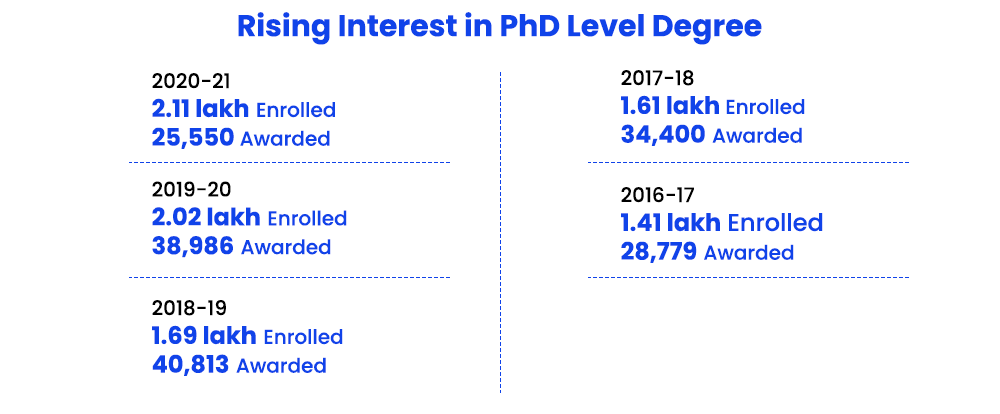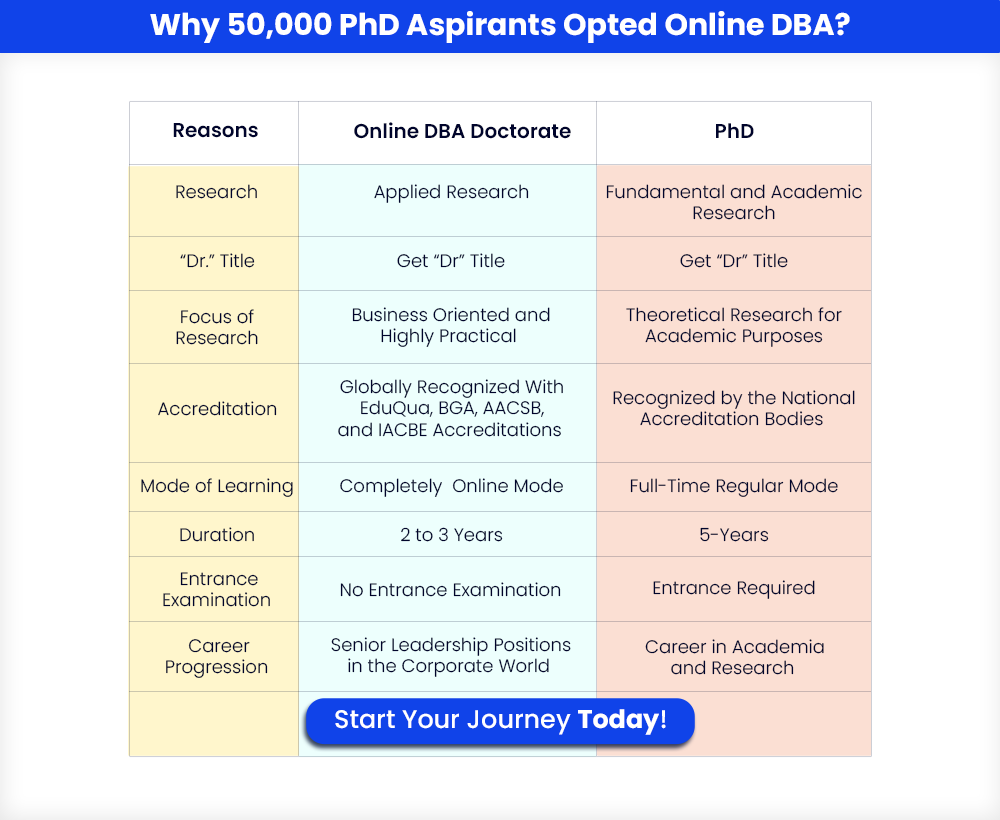Expert Interviews
- University Reviews
- Career Guide
 Video Counseling
Video CounselingImportant Facts
- Ask any Question - CV Forum

What is a Doctorate: Everything You Need to Know!
Muhammad Hasim Sheikh Apr 17, 2025 1.8K Reads

Have you pursued your master’s degree and looking to get ahead in your career? Then, you should be reading this blog. In this blog, we will cover everything about doctoral degrees, what are the top streams to pursue a doctorate. Also, we will dig deeper to know about many more aspects related to doctorate degrees.
Latest News:
UGC NET 2024 starts its registration for the entrance exam and shares the details of eligibility, fees, and other criteria related to the entrance exam of UGC NET 2024 in the latest notice of NTA, click here for more details.
Now, graduates with four-year undergraduate degrees can apply for a PhD program directly via UGC-NET ( National Eligibility Test), click here to know more details.
What is a Doctorate Degree?
Doctorate degrees are the highest degree of education which is offered to the candidates after the completion of the post-graduation. The doctorate program can be pursued in various streams and specializations. Doctorate degrees can be offered to the students only after the successful completion and publishing of the thesis. They are highly focused on creating something unique and innovative that is relevant to the industry and society. Also Available | Pre-Doctoral Program!
After the completion of the doctorate program, students get the title of Dr. as a prefix to their name. This is a three to five-year program that can pursued on-campus or in online mode. The mode of education varies for different universities. The students must check the eligibility criteria before applying to the doctorate programs. Many public, and private universities and institutes offer Doctorate programs in science, commerce, and arts & humanities field.

Two Types of Doctorate Degrees?
The students mostly enroll in two types of doctorate degrees, one that is more research-oriented and the other that is a practical application-based degree. Here is a simple explanation of and difference between
- Professional Doctorate
- PhD (Doctor of Philosophy)
What is a Professional Doctorate?
The professional doctorate is specially designed for working executives who are eager to learn the in-depth concepts that can help them get better in industry roles and make them ready to take high positions and job roles. The students pursue professional doctorates online as well as on-campus mode. There are various universities where you can get a specialization that aligns with your career field.
Top Professional Doctorate for working professionals are
| Top Professional Doctorate for working professionals | |
|
Doctor of Education (EdD) |
|
|
Doctor of Professional Studies – Instructional Design Leadership |
Doctor of Fine Arts (DFA.) |
|
Doctor of Social Work (DSW) |
Doctor of Hebrew Letters (DHL) |
|
Doctor of Juridical Science (JSD, SJD) |
Doctor of Musical Arts (DMA) |
|
Doctor of Healthcare Administration (DHA) |
Doctor of Music Education (DME) |
|
Doctor of Finance (DPH) |
Doctor of Modern Languages (DML) |
|
Doctor of Pharmacy (Pharm.D.) |
Doctor of Nursing Science (DNSc) |
|
Doctor of Arts (DA) |
Doctor of Public Health (DPH) |
|
Doctor of Business Administration (DBA) |
Doctor of Sacred Theology (STD) |
|
Doctor of Canon Law (JCD) |
Doctor of Science (DSc, ScD) |
|
Doctor of Design (DDes) |
Doctor of Theology (ThD) |
|
Doctor of Engineering or Engineering Science (DEng, DESc, DES) |
- |
Apart from this professional doctorate, there are many more. You can check the top universities that offer doctorate programs and opt for one as per your eligibility criteria.
Duration of the professional doctorate program
Usually, the professional doctorate can be pursued within 3 to 5 years, but that completely depends on the thesis's final review & submission. It depends on your on-time submissions of the assignments, reports and case studies reports. The duration can vary depending on the specialization opted.
What are the benefits of pursuing a professional doctorate?
It is an amazing option for students who are willing to advance their skills in their respective study fields. Their work experience helps them to understand the concepts taught in the doctorate program better. Here are the top benefits of enrolling in a professional doctorate.
- You will learn the advanced skills and career opportunities that are essential for getting a senior-level position in your sector.
- There will be various opportunities waiting for you after completion of the professional doctorate.
- These degrees equip the students with a perfect balance of understanding both theoretical concepts and later using these concepts at the market level on practical ground.
- Most of the working professionals feel stuck in their current job role and lag the growth. This doctorate program can help you get a career trajectory by getting a solid grip on the concepts and their application on the practical ground.

What are the eligibility criteria to enroll in the professional doctorate?
The candidates have to meet some basic eligibility criteria to get into the professional doctorate program. However, the eligibility may vary depending on the type of program chosen and the university selected.
- Candidates having master’s degrees from a recognized institute can enroll.
- Students with bachelor’s degrees can also apply but only with the required work experience.
- The years of work experience requirement varies for every institute.
What is the Demand for Doctoral Degrees?
The demand for doctorate degrees varies by field and position. Trends in degree completions highlight the state of doctoral education. From 2012 to 2022, the number of doctoral degrees grew by 20%, from 170,815 to 205,341, according to Lightcast Analytics.
The fields with the most growth in demand for doctorates included:
- Business, Management, Marketing, and Related Programs (+75%)
- Computer and Information Sciences and Support Services (+64%)
- Education (+49%)
- Health Professions and Related Programs (+49%)
- Engineering (+38%)
Specific doctoral programs with the greatest growth were:
- Occupational Therapy/Therapist (+1,134%)
- Nursing Practice (+614%)
- Organizational Leadership (+368%)
- Social Work (+154%)
Programs with the greatest decrease in demand included:
- Divinity/Ministry (-42%)
- History (-26%)
- Law (-22%)
- Psychology (-16%)
These trends indicate that growing industries require more highly skilled employees, increasing the demand for doctorates. In contrast, stagnant industries require fewer experts, leading to a decreased demand for doctoral degrees.
How Doctorate Degree Works?
The path to a doctoral degree usually includes four stages of coursework: a research core, major focus area courses, electives, and dissertation courses.
- The Research Core: Most doctoral programs start with a common core of classes to build foundational skills for the degree. This core often includes advanced writing methods, research methodology, applied statistics, courses, and qualitative and quantitative research.
- Major Focus Area: After completing the research core, you'll take courses in your major emphasis.
- For a DBA (Doctor of Business Administration), courses might include organizational behavior, organizational systems, strategic thinking, decision-making, ethics, and change management.
- For a DHA (Doctor of Healthcare Administration), courses might include healthcare policy, healthcare economics, finance, quality improvement, and health information governance.
- For a Ph.D. in Human Services, courses might include advanced research methods for public service, social influences of behavior, ethics in decision-making, and advanced communication.
- Electives: Most doctoral programs require electives within your field to give you a broader view.
- For a Doctor of Education (Ed.D.), electives might include Higher Education Leadership, PK-12 Educational Leadership, and Organizational Leadership.
- Dissertation Requirements: After completing your core, focus area, and electives, you'll work on your dissertation. This can vary by program.
- For Ph.D. students, the dissertation usually has five chapters and is completed in three phases: submitting a prospectus, finalizing the first chapters collecting data, and completing and defending the dissertation.
- For applied doctorate students, the dissertation involves creating a solution to a real-world problem.
- Investigate Dissertation Structures: It's important to understand the dissertation structure at prospective schools. Researching this can help you choose a school that will support you in completing your dissertation.
Various University has a structured approach to help you complete your dissertation, starting with enrollment. They offer faculty mentoring, guidance, and peer support throughout the program. During your doctoral courses, you'll develop research skills and writing ability to complete a dissertation. Your dissertation will show your ability to identify a workplace problem, propose a solution, and test your hypotheses in the real world.
Who should pursue a Doctorate Program?
A doctorate increases your wage, opens doors in higher education, or fulfills a lifelong desire. Good doctoral students are organized, curious, and skilled at managing their time. They often hold a relevant master's degree or have professional experience.
Many doctoral candidates have full-time jobs, families, and community roles. Therefore, strong motivation and resilience are vital. Despite the challenges, earning a doctorate is worth it. It has a life-changing impact on your career and personal growth. A doctoral program is a big commitment with a big return on investment for master's degree holders.
If you want to teach at a college or university, you need this degree. If you want to move into industry leadership, this degree gives you credibility. If you're aiming for a top executive position, this degree can set you apart.
Such courses are offered by foreign universities and are recognised globally including India. Some Top Institutes offering professional doctorates are
- Golden Gate University
- Wilmington University
- Liberty University
- Swiss School of Business and Management
- University of Missouri
- Rushford Business School
- Columbia Southern University
- William Howard Taft University
- George Fox University
- Florida International University
- Johnson & Wales University
What is a PhD (Doctor of Philosophy)?
It is a research-oriented degree program and is considered to be the highest academic degree. It is abbreviated as PhD which means Doctor of Philosophy. It is essential to create an original and innovative research program that can help in expanding the boundaries of the subject knowledge. The student can become a university professor, scientist, or researcher in the relevant field after the completion of the PhD. The students have to complete the master's degree to enroll in the PhD program. However, this eligibility factor varies for different institutes and course fields.
|
Doctoral Program (Working Professionals) |
|
Many students get confused after looking at the expanded form of PhD that says Doctor of Philosophy. The philosophy word here does not refer to any subject. PhD is the abbreviation of the Latin term (Ph)ilosophiae (D)octor. Here Philosophy's original Greek meaning is the “lover of wisdom”.
PhD Courses List
|
Course |
Specialization |
|
Science |
|
|
Arts |
|
|
Medical |
|
|
Paramedical |
|
|
Engineering |
|
|
Design |
|
|
Management |
|
|
Agriculture |
|
|
Commerce |
|
|
Mass communications |
|
|
Law |
|
|
Veterinary sciences |
|
|
Education |
|
|
Dental |
|
|
Hotel management |
|
What are the eligibility criteria to apply for the PhD?
There are some strict eligibility criteria that students have to fulfill to get into any PhD program. Some of them are-
- The candidate must have pursued a master’s degree from a recognized institute with a minimum of 55% marks or equivalent.
- They must pass the entrance examination like NET/CSIR/ or other university entrance examinations.
Duration of the PhD
The PhD is 5 to 7 years long, and it can extend even further. The focus of PhD is to create freshly brewed and unique research work. That sometimes becomes so time-consuming and takes longer than expected. They focus on expanding the boundaries of the subject knowledge by doing various research and studying various case studies that lead to delay.
Top Colleges and Universities to Pursue PhD in India
| Top Colleges and Universities for PhD | |
|
Indian Institute of Science |
Delhi Technological University |
|
Anna University |
Manipal Academy of Higher Education |
|
Amity University |
National Institute of Technology |
|
Aligarh Muslim University |
Lovely Professional University |
|
University of Delhi |
Jamia Millia Islamia |
|
Birla Institute of Technology and Science |
Jawaharlal Nehru University |
|
Banaras Hindu University |
Amrita University |
|
Alagappa University |
Vellore Institute of Technology (VIT) |
|
Indian Institute of Technology |
Indian Institute of Science Education and Research (IISER) |
|
Jamia Hamdard |
|
What is the Cost of a Doctorate Program?
- The fee for a PhD course is around INR 80,000 to INR 1,20,000 per year, but this can vary depending on the university. To gain admission, candidates must pass entrance exams like UGC-NET/JRF, CSIR-NET, and DBT-JRF, and also clear an interview or viva.
- A PhD is the highest academic degree, showing expertise in a specific field and the ability to conduct original research. The duration for a PhD program is three years, with a maximum limit of five to six years, depending on the institution. Candidates must hold a master’s degree to be eligible.
- PhD programs require students to select a research topic and conduct in-depth research. Financial aid and scholarships are often available from universities, government agencies like CSIR and UGC, and through entrance exams such as UGC NET, GATE, and JEST.
- PhD courses through distance and Online education are no longer recognized, per UGC guidelines. Top institutions for PhD programs in India include SKU University, WC University, Singhina University, and NIILM University. Career opportunities for PhD holders span academia, research, and development in private and government sectors and entrepreneurship.
The curriculum of the Doctorate Program
The syllabus and the concepts taught in both types of doctorate remain the same. The candidate gets to know the inside out of the whole concept, followed by creating innovative research work. The course curriculum varies for research-based doctorate programs and professional doctorates only because the latter has an in-depth understanding of the application of theoretical concepts.
This gives an upper hand to the professionals to get better job and career opportunities. The rest curriculum remains the same for both. The Research work is the most crucial part of the doctoral program. Your doctorate can not be accomplished without this. The research topic has to be original and well-structured. In a professional degree, students have to do industry-relevant research.
|
Top Trending Articles In Doctorate Domain |
|
|
Doctorate of Business Administration (DBA) Top Subjects & Syllabus |
|
There lies a big confusion about which doctorate program to opt for, research Ph.D. or the professional doctorate program. The answer is simple and depends only on you. Candidates with a knack for getting into the research field can opt for a research-based PhD, while the candidates who are working professionals and looking to upskill their existing knowledge can get into professional degree programs that can be done online, as well in regular mode. Both of them are valid for all types of job roles and carry equal status and recognition globally.
FAQs (Frequently Asked Questions)
Yes, both are equivalent are the highest academic degrees, and are globally recognized. The only difference between these two is that a PhD is an academic degree, more about research while a doctorate is both an academic and professional degree.
Both are equivalent and carry equal

10 Years of Experience / Storyteller / Research-driven Writer
As an Academic Content Writer and Content strategist, I have great experience in crafting high-quality, research-based content across diverse subjects. My academic background with a doctorate in business Management allows me to create informative and engaging academic materials for students, educators, and institutions. I have expertise in developing well-researched course materials, academic blog
Every query is essential.
Our team of experts, or experienced individuals, will answer it within 24 hours.
Recommended for you
Tired of dealing with call centers!
Get a professional advisor for Career!
LIFETIME FREE
Rs.1499(Exclusive offer for today)

Pooja
MBA 7 yrs exp

Sarthak
M.Com 4 yrs exp

Kapil Gupta
MCA 5 yrs exp
or



Career Finder
(Career Suitability Test)
Explore and Find out your Most Suitable Career Path. Get Started with our Career Finder Tool Now!
ROI Calculator
Find out the expected salary, costs, and ROI of your chosen online university with our free calculator.


